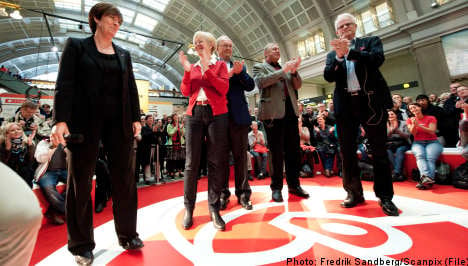In Sweden, where Social Democrats have been in government for 65 of the last 78 years, they just lost their second consecutive election and ended up with 31 per cent of the votes – their lowest support in a century. The situation in the other Nordic countries, formerly with strong Social Democratic parties, is similar: Norway 35 per cent, Denmark 26 per cent, and Finland 21 per cent. In France, the Socialists have been in disarray for some time, in Germany the SPD was supported by a mere 23 per cent and in the UK, Labour got 29 per cent.
This is part of a downward trend which has been visible since the 1950s, and the fall has been accelerated during the last decade. And this happens in a time of financial crisis and deep recession, when the traditional Social Democratic idea of big government, if ever, should have prospects of gaining support. Clearly, this phenomenon cannot be explained by temporary mistakes in election campaigns, one or two weak leaders or any of those other visible factors on the surface so often discussed in the media.
The fact that our societies are changing in several quite fundamental ways could explain much more of this shift. Trade unions traditionally support the Social Democrats and trade union membership has been falling for decades – from different levels in different countries, but the trend is the same. It is generally acknowledged that Ed Miliband won the leadership contest thanks to trade unions. They still retain the power over their parties, but their influence in society is decreasing.
For decades, Europe has been marching into the services society, seeing employment in manufacturing industry decreasing – thanks to globalization and technological development. This means that the traditional base for Social Democratic parties – workers – is getting ever smaller. On average, seven out of ten Europeans now work in the services sector, which is different from the manufacturing industry. Often, individual skill, rather than collective strength, is essential.
Economic freedom has increased throughout the world for 25 years, not least in Europe. Of course this is true for Eastern and Central Europe, but for Western Europe too. State ownership has decreased, markets have been liberalized, tax rates have decreased, foreign trade has opened up, choice in welfare services has increased and public monopolies have been dismantled. Many of these reforms were controversial at the time, but have become universally accepted afterwards. People don’t want to go back.
People have simply increasingly managed without too much government interference in their lives, and this has been appreciated. Combine this with rising incomes – however slowly in some European countries, fairly stable consumer prices – several categories of goods actually have actually gotten cheaper – and more people belonging to the middle class. Social Democrats have failed to see this and have not changed their policies or messages to appeal to this new society.
It has also become increasingly difficult to be a party for workers with policies that make it more expensive to hire people, that make work less profitable and that make the labor market less flexible. Paying vast amounts of people through social security for not working has become expensive, and many countries have large numbers of unemployed people hidden in statistics like sick leave or early retirement. This has also had a detrimental effect on work ethics. According to the World Values Survey, support for the principle of receiving contributions from the state when not working is declining.
Some have claimed that the absence of success for the left after the financial crisis can be explained by the centre-right taking over their policies and rhetoric. True, in half of the rich countries, the role of government in society has increased. But many countries have also continued to increase economic freedom. And above all, the countries that have stuck to the most classic Keynesian economic policies – like the UK – have been governed by Social democrats and their failure in crisis management has been spectacular.
The GDP of Sweden, Germany and the UK all fell by five percent in 2009 as the financial crisis struck. But the three nations have dealt with the crisis quite differently. The UK, which until the 2010 elections was dominated by Labour rule, is facing substantial problems. The public deficit has been twelve percent of GDP during the past two years and is expected to remain high. The British national debt is approaching 90 percent. The UK has simply not been able to cope with the massive increase in public expenditure which has occurred during the last ten years of Labour rule.
The center-right government of Sweden, on the other hand, has managed to keep the public deficit at a low level, whilst still reducing tax levels quite significantly. Germany, until recently ruled by a Grand coalition between the centre-left and the centre-right, has experienced higher deficits than Sweden, but much lower than the UK. If there is a lesson to learn from these three nations, it is that social democratic policies bent on increasing government expenditure further and further is simply not a viable recipe for Europe. Perhaps it is not surprising that Social Democratic parties in all three nations have recently experienced major setbacks.
New Labour represented the perhaps boldest step in attempting to renew Social Democrats, in embracing globalization, welfare reform and individual freedom. In the 1990s, there was talk of the new “middle” in European politics. This is all gone and partly reversed. The forces against such a development were too strong. It seems that the more clearly traditional leftist approach is here to stay, which would seem to guarantee the continuation of the downward trend and marginalization for European Social Democrats.
Johnny Munkhammar
Member of Parliament, Sweden, Moderate Party
Nima Sanandaji.
Managing Director, Captus



 Please whitelist us to continue reading.
Please whitelist us to continue reading.
Member comments